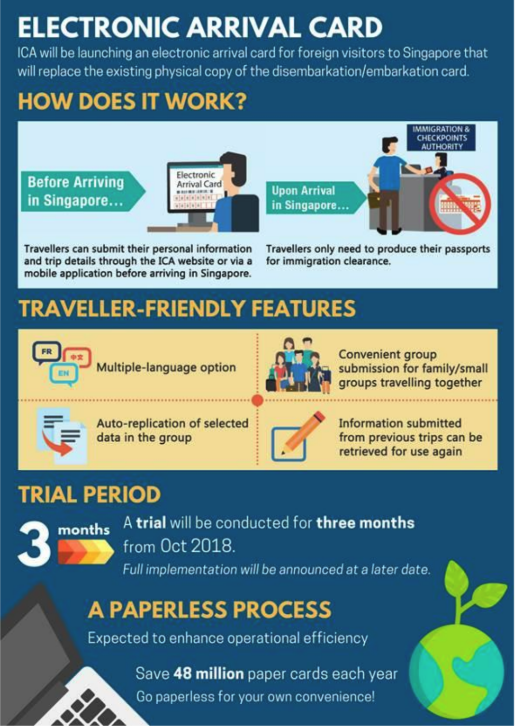ICA to launch electronic arrival card for foreign visitors to Singapore after three-month trial
Sign up now: Get ST's newsletters delivered to your inbox

The electronic arrival card will be available in various languages, and those travelling in families or small groups can choose to make a one-time group submission.
PHOTO: ST FILE
Derek Wong
Follow topic:
SINGAPORE - The Immigration and Checkpoints Authority (ICA) will be launching an electronic arrival card that will eventually replace the paper-based disembarkation/embarkation card that foreign visitors are currently required to submit on arrival, said the authority in a statement on Wednesday (Oct 3).
To ensure smooth implementation of the new electronic arrival card, a trial will be conducted by the ICA for foreign visitors for three months from Thursday.
The trial will be conducted at most of the air, land and sea checkpoints such as the Woodlands and Tuas checkpoints, Changi Airport and the four cruise/ferry terminals.
During the trial period, foreign visitors who arrive at these checkpoints but have not yet completed the paper-based disembarkation/embarkation card may be approached by ICA officers to participate in the trial and provide feedback.
The trial will not affect Singaporeans, permanent residents and long-term pass holders (such as students and workers) returning to Singapore, as they do not need to submit any disembarkation/embarkation card.
More details of the implementation of the system will be announced at a later date, after the trial is completed.
When the electronic arrival card is fully implemented, travellers can submit their personal information and trip details through the ICA website or via a mobile application before arriving in Singapore.
The travellers will then need to produce only their passports for immigration clearance upon arrival.
Currently, the card contains information such as details of the traveller's flight to Singapore, his intended length of stay and where he will be staying. These details will still be required under the new electronic card.

The electronic arrival card will be available in various languages, and those travelling in families or small groups can choose to make a one-time group submission. Some information such as last port of embarkation as well as address in Singapore will be automatically replicated for all in the group.
The mobile app will also save information from previous trips for use during the next trip to Singapore.
"The electronic arrival card will enhance operational efficiency and is a significant step towards ICA's vision of paperless immigration clearance, and save up to 48 million paper-based disembarkation/embarkation cards a year," said the authority.
ICA said that it studied and took into consideration the practice and experience of countries that have implemented a similar model of the electronic arrival card, as part of the authority's conceptualisation and design process.
Mr Duong Dat, 23, a software engineer from Vietnam who visits Singapore once or twice a year to meet friends, said an electronic arrival card would be great, as it will reduce the waiting time at arrival.
He added that it will also remove the last-minute scramble for him to fill up the information. "Sometimes my itinerary information is not available if I have no Internet connection (on the plane) and I have to write it down at the airport."
Bruneian Hana Latiff, 24, who visited Singapore twice this year for youth programmes, is happy that the paper use will be reduced.
She also noted that the data-saving feature will be handy as she would not have to fill the form every time.
But Ms Hana, an administrative staff, added: "I might be concerned (about going online), as I am not sure how secure my data will be."
The move is part of a series of recent high-tech measures by ICA.
Earlier this year, X-ray imaging scanners were introduced at the Tuas Checkpoint to better detect components on buses and vans that have been modified or contain explosives.
A new Web portal called MyICA was also launched by the authority in June to make renewing and applying for a new Singapore passport easier.
In August this year, eye-scan trials were rolled out for Singaporeans and permanent residents at Woodlands and Tuas checkpoints, and Tanah Merah Ferry Terminal. The trial involves officers scanning travellers' iris images in addition to fingerprint verification.

